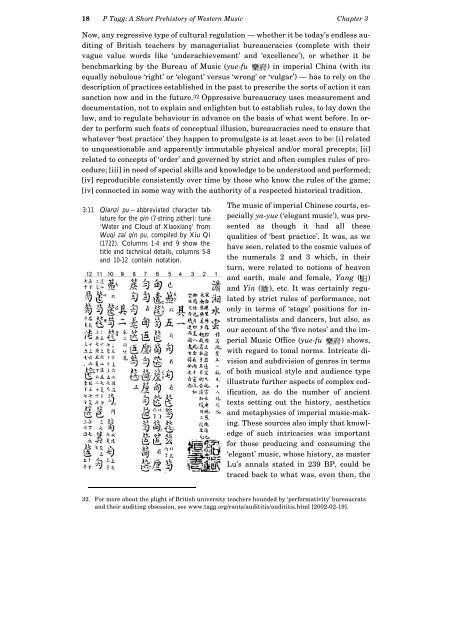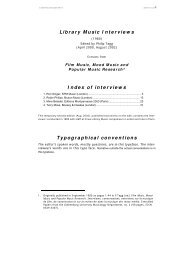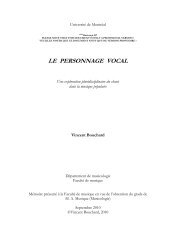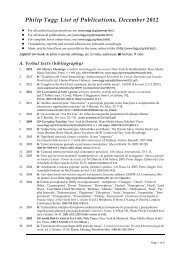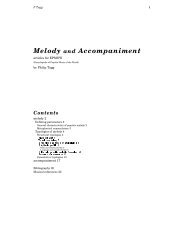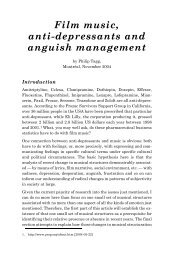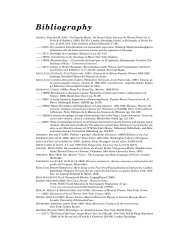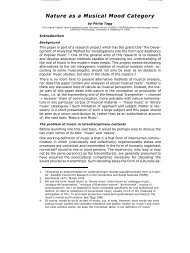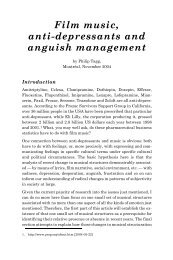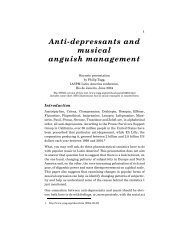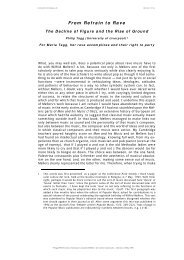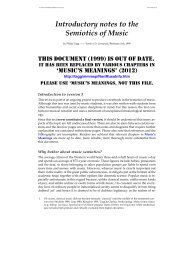A Short Prehistory of Western Music, Chapter 3
A Short Prehistory of Western Music, Chapter 3
A Short Prehistory of Western Music, Chapter 3
You also want an ePaper? Increase the reach of your titles
YUMPU automatically turns print PDFs into web optimized ePapers that Google loves.
18 P Tagg: A <strong>Short</strong> <strong>Prehistory</strong> <strong>of</strong> <strong>Western</strong> <strong>Music</strong> <strong>Chapter</strong> 3<br />
Now, any regressive type <strong>of</strong> cultural regulation — whether it be today’s endless auditing<br />
<strong>of</strong> British teachers by managerialist bureaucracies (complete with their<br />
vague value words like ‘underachievement’ and ‘excellence’), or whether it be<br />
benchmarking by the Bureau <strong>of</strong> <strong>Music</strong> (yue-fu ) in imperial China (with its<br />
equally nebulous ‘right’ or ‘elegant’ versus ‘wrong’ or ‘vulgar’) — has to rely on the<br />
description <strong>of</strong> practices established in the past to prescribe the sorts <strong>of</strong> action it can<br />
sanction now and in the future. 32 Oppressive bureaucracy uses measurement and<br />
documentation, not to explain and enlighten but to establish rules, to lay down the<br />
law, and to regulate behaviour in advance on the basis <strong>of</strong> what went before. In order<br />
to perform such feats <strong>of</strong> conceptual illusion, bureaucracies need to ensure that<br />
whatever ‘best practice’ they happen to promulgate is at least seen to be: [i] related<br />
to unquestionable and apparently immutable physical and/or moral precepts; [ii]<br />
related to concepts <strong>of</strong> ‘order’ and governed by strict and <strong>of</strong>ten complex rules <strong>of</strong> procedure;<br />
[iii] in need <strong>of</strong> special skills and knowledge to be understood and performed;<br />
[iv] reproducible consistently over time by those who know the rules <strong>of</strong> the game;<br />
[iv] connected in some way with the authority <strong>of</strong> a respected historical tradition.<br />
3:11 Qianzi pu – abbreviated character tablature<br />
for the qin (7-string zither): tune<br />
‘Water and Cloud <strong>of</strong> Xiaoxiang’ from<br />
Wuqi zai qin pu, compiled by Xiu Qi<br />
(1722). Columns 1-4 and 9 show the<br />
title and technical details, columns 5-8<br />
and 10-12 contain notation.<br />
The music <strong>of</strong> imperial Chinese courts, especially<br />
ya-yue (‘elegant music’), was presented<br />
as though it had all these<br />
qualities <strong>of</strong> ‘best practice’. It was, as we<br />
have seen, related to the cosmic values <strong>of</strong><br />
the numerals 2 and 3 which, in their<br />
turn, were related to notions <strong>of</strong> heaven<br />
and earth, male and female, Yang ( )<br />
and Yin ( ), etc. It was certainly regulated<br />
by strict rules <strong>of</strong> performance, not<br />
only in terms <strong>of</strong> ‘stage’ positions for instrumentalists<br />
and dancers, but also, as<br />
our account <strong>of</strong> the ‘five notes’ and the imperial<br />
<strong>Music</strong> Office (yue-fu ) shows,<br />
with regard to tonal norms. Intricate division<br />
and subdivision <strong>of</strong> genres in terms<br />
<strong>of</strong> both musical style and audience type<br />
illustrate further aspects <strong>of</strong> complex codification,<br />
as do the number <strong>of</strong> ancient<br />
texts setting out the history, aesthetics<br />
and metaphysics <strong>of</strong> imperial music-making.<br />
These sources also imply that knowledge<br />
<strong>of</strong> such intricacies was important<br />
for those producing and consuming the<br />
‘elegant’ music, whose history, as master<br />
Lu’s annals stated in 239 BP, could be<br />
traced back to what was, even then, the<br />
32. For more about the plight <strong>of</strong> British university teachers hounded by ‘performativity’ bureaucrats<br />
and their auditing obsession, see www.tagg.org/rants/audititis/audititis.html [2002-02-19].


